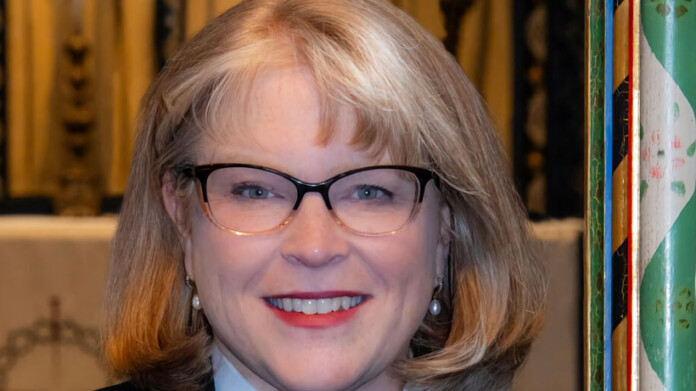The Rev. Julia Whitworth, who will be consecrated October 19 as the 17th Bishop of Massachusetts, is eager to address the challenges of leading a large diocese based in the city of Boston.
“I want to come in and know the diocese and be known. I want to build trust, be a keen listener, and know where the yearnings and longings are,” Whitworth said about her first expected steps for Massachusetts. She’s excited by the prospects of work in the diocese: it’s one of the largest in the country, with 180 parishes, missions, chapels, and chaplaincies, and a large variety of parachurch organizations.
She sees a lot of opportunities for growth. “There’s a longing for community that people can’t necessarily identify. There’s a crisis of belonging right now,” she said. “Belonging to the body of Christ is belonging to a body of love.” She thinks the Episcopal Church has a lot to offer, and her goal is helping people learn about it.
One strength she sees is the breadth of worship found in the Episcopal Church. “I love our denomination. We have such a rich diversity of people and ways of practicing our faith,” she said. “There are ways to be creative with our liturgy for people who have been hurt by traditional church, and there are also ways to pull from ancient practices.” The Diocese of Massachusetts has services in 16 different languages, and she’s looking forward to working with immigrant communities.
Another strength she sees in Massachusetts is on vocations. “There’s a rich history of supporting and raising up young adults,” she said. In the last ordination cycle, Massachusetts ordained eight new priests.
She recalls that when she was a teenager in Virginia, Bishop Peter Lee asked her to consider the priesthood, and this was in the 1980s, when female priests were not common. “It was a powerful call on my life. I hope to be part of that work for others,” she said.
She also wants to work with the Anglican Studies program at Boston University’s School of Theology, which the diocese has supported since the relocation of the Episcopal Divinity School. There are also numerous university chaplaincies, both in Boston and elsewhere in the state, such as the University of Massachusetts Dartmouth, that she hopes to strengthen.
Some of the diocese’s 180 parishes are very small. She wants to work with smaller churches to provide resources and ideas for them to think about creative new ways to evangelize. “I want to gather people in the diocese and make strategies together, especially across churches — not just small church to small church, but small church to large church,” she said. She’s also big on good communication, and thinking about how parishes can tell their story and why they’re important to people who don’t know about them.
In addition to its parishes, Massachusetts has five Episcopal schools. Whitworth was previously on the governing board of the National Association of Episcopal Schools, and she sees them as highly important. “I believe that educational spaces are amazing missional fields for our church — spaces where we can live into the traditions of our faith, our deep respect for diversity, and our passion for social justice,” she said.
Epiphany School in Boston and Esperanza Academy in Lawrence are tuition-free and educate children from highly disadvantaged backgrounds, a mission she wants to work on promoting. Three others, the Groton School, St. Mark’s School in Southborough, and Brooks School in North Andover, are college preparatory boarding schools. Her goal is to work with chaplains to strengthen the schools’ identity as Episcopal and to build a ministry of “relationship and presence.”
Whitworth comes from Trinity Episcopal Church in Indianapolis, which she has served as rector since 2016. Trinity is a large parish with a variety of outreach ministries, and she thinks this experience will serve her well as a bishop. She’s particularly proud of her work with LGBT outreach, including helping found Trinity Haven, the first dedicated house for LGBT youth at risk of homelessness in Indiana.
“I love being a spiritual witness,” she said about doing theologically informed advocacy. But she also knows that Massachusetts has different needs than Indiana, and she wants to learn from the people already doing the work first. One thing she wants to work on is advocacy for the unhoused, particularly in the area surrounding the cathedral in downtown Boston. She looks forward to joining the work of MANNA, the ministry of St. Paul’s Cathedral for and with the unhoused, as well as engaging theologically and publicly on climate and racial injustice. “I want to be a witness for God’s justice,” she said.
Whitworth will be the first woman to serve as diocesan Bishop of Massachusetts. She was elected on the fourth ballot from a five-person slate on May 18.
The diocese has a long legacy of senior female leadership, having elected the Anglican Communion’s first female bishop, the Rt. Rev. Barbara C. Harris, as a suffragan bishop in 1988. Two other women have served as suffragan bishops in the diocese since then, the Rt. Rev. Gayle Harris and the Rt. Rev. Carol Gallagher.
Whitworth was ordained to the priesthood in 2010 by Bishop Mark Sisk of New York. Before Trinity Episcopal Church, she served as Canon for Liturgy and the Arts at the Cathedral of St. John the Divine in New York City and assistant rector at St. James’ Episcopal Church in West Hartford, Connecticut. She served on General Convention’s Liturgy and Music Legislative Committee in 2024.
She holds a master of divinity from Union Theological Seminary in New York, as well as an M.A. and M.Phil from New York University and a B.A. from Dartmouth College. She previously taught courses in theater at New York University, Mount Holyoke College, and the University of Massachusetts Amherst, and directed theatrical productions at different venues in the Northeast. She and her husband, Ray Neufeld, have three children.




